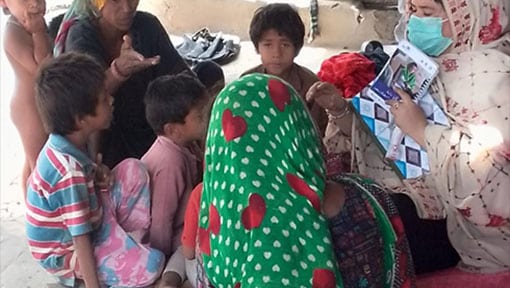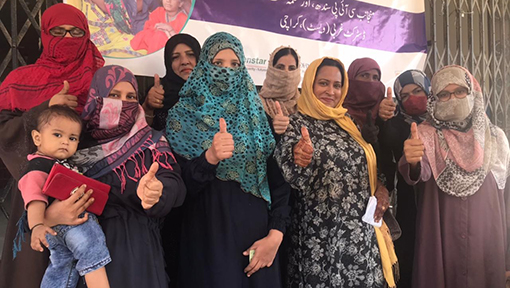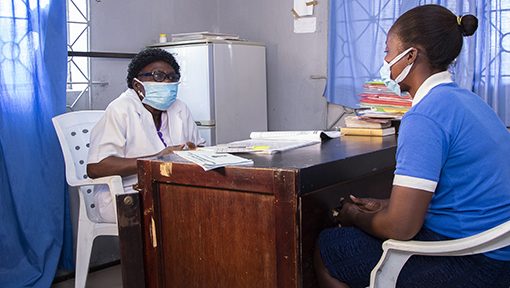Reaching Youth and Their Gatekeepers Through Intergenerational Family Planning Dialogues in Mombasa

Celina (right) sharing her plans with the County Reproductive Health Coordinator during a program implementation team meeting in Mombasa.
Celina Githinji, the Adolescent and Youth Coordinator in Kenya’s Mombasa County, knows all too well the emotional and psychological challenges that young women and men face as they often seek her counsel and support. As the health officer responsible for adolescent and youth sexual and reproductive health (AYSRH) and gender-based violence activities, she is intimately involved in the County’s response to matters affecting their well-being. She explained:
I like to be able to support our girls and boys and contribute to the implementation of initiatives that will help address the challenges they go through.”
In Mombasa County, one-third of pregnancies each year are not planned, and one-third of unplanned pregnancies end in abortion. Data from the Kenya Demographic and Health Survey (KDHS 2014) shows that almost one in five girls between the ages of 15 and 19 are reported to be pregnant or have a child already. This trend has been fairly consistent for more than two decades with little change in prevalence between 1993 and 2014.
This issue gained recognition in the County and the health management team is implementing various interventions with added focus on young people. Through The Challenge Initiative (TCI), the County received funding to implement high-impact interventions that address some of the challenges young people experience accessing contraceptive services. One of those challenges is their inability to access services. While reproductive health services are open to everyone, adolescents and youth often experience bias with their parents and guardians making most health decisions on their behalf.
With support from TCI, the health management team decided to implement TCI’s high-impact intergenerational dialogue intervention as a way to overcome parental and community biases towards young people’s access to reproductive health services. Celina shared:
When we started these dialogues, we got an opportunity to discuss reproductive health matters openly. The first session was so successful, and I thought to myself ‘why not make this like my favorite TV series?’ which comes on weekly without fail.”
These dialogues are based on strengthening dialogue between all generations, so that the whole community engages in a collective process of change. Intergenerational dialogues aims to bridge the gap between different community members’ opinions and empowers people to discuss issues openly. Celina said after she shared her ideas for a structured community dialogue series with the health management team, it was approved.
Since then, Celina has been conducting dialogues and sharing reproductive health information while making sure to focus on gender-related issues as well with key community stakeholders.
Through TCI’s Sisi kwa Sisi coaching model, Celina has coached 10 of her peers. She wants to reach as many community stakeholders as possible and her peers will help her to do so. She explained why the community dialogues are so important:
The sessions have enabled the County to build relations throughout communities and generations, reaching ‘gatekeepers,’ like cultural, religious and local leaders, who help develop action plans to address social and cultural norms that may hinder young person’s access to reproductive health information and services.”
Dialogues with community members go over issues like contraceptive myths and misconceptions, sexually transmitted infections, engaging community members, men and boys, local leaders and social norms that permit gender-based violence. This way the County contributes to the creation of a supportive environment for adolescents and youth. Mwanakarama Athman, Mombasa County’s Reproductive Health Coordinator, added:
We have also added mentorship and coaching activities to youth champions in advocacy and communication, demystifying misconceptions and myths about reproductive health among their peers.”
With other health providers, Celina has also explored new ways of reaching adolescents and youth, including through their mobile phones. Many adolescents are now using WhatsApp to share information about sexual and reproductive health issues they face. As a result, the County has created a toll-free number and mobile SMS code that youth can use to get information, counseling and answers to their reproductive health questions. Reaching youth where they are with the information that they need is critical; however, the social and cultural context in which they operate cannot be overlooked and that is why it is so important to not only reach them with information and services but also their parents, guardians and the community at large.






